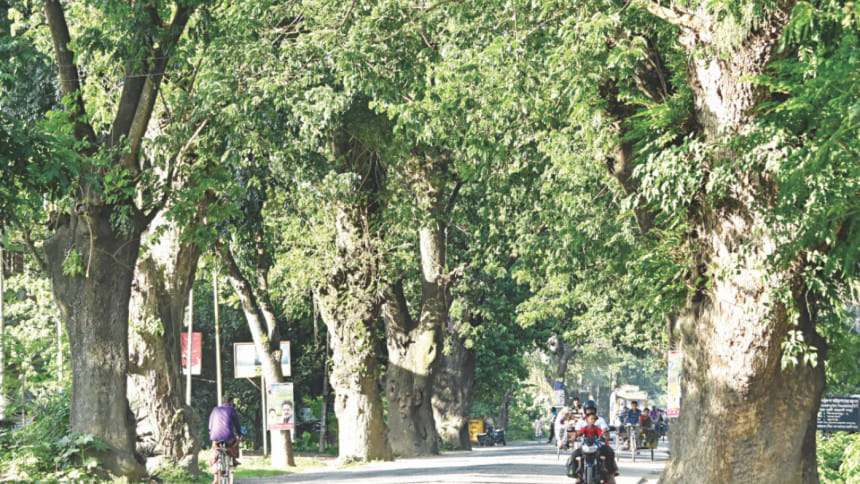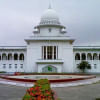The corrupt feast on Jessore Road

The historic Jessore Road, immortalised in Allen Ginsberg's poem “September on Jessore Road”, is steadily losing the essence of its legacy due to a corrupt chain of unbridled tree-felling.
Over the years, the trees on the road were felled showing various reasons. New grounds were created for cutting down the trees, which would eventually go on to be sold for much less than their market price, benefitting different stakeholders.
Between 2003 and 2004 for example, Arboriculture Department of Rajshahi under the Roads and Highway Department (RHD) sold 209 rain trees, of them many aged around two hundred years, for around Tk 11 lakh, said Saifuzzaman Pikul, chairman of Jessore District Council, the institution that owns the land.
On average, each of the around 18 diameter trees was sold for about Tk 5,000 only.
The total price of the trees was at least Tk 2 crore at the time, Pikul said.
While the tender for the sale of trees was being done, a row arose between Jessore District Council and the RHD over the ownership of the property along the highway.
After the trees were felled, the district council filed a complaint with Jessore Anti-Corruption Commission against Arboriculture Department of Rajshahi for selling the trees at such a low price, said Pikul.
An investigation is still going on in this regard, he added.
Pikul estimated that of 3,800 trees that still stand, only 660 two-century old rain trees remain on the 38 kilometres stretch of the 99km long Jessore Road stretching from Jessore in Bangladesh to Dum Dum in Kolkata.
He blamed the Arboriculture Department of Rajshahi for felling the trees at different times.
Palash Sarkar, executive director of Arboriculture Department of Rajshahi, said he has no knowledge about the complaint as he joined the post in 2014.
Environmentalists suspect that there is a personal gaining for some in regards to the felling of trees.
The move to cut down the trees is about looting the woods, said professor Amirul Alam Khan, an environmentalist and also the former chairman of Jessore education board.
“They [a vested quarter] have the desire to make money by selling the trees showing low book value”, he added.
Although there is enough government land where new lanes can be built on either side, the move to cut trees shows the real intention of some people, Amirul said.
The stretch on the Bangladesh side is 38kms long, and on both the south and the north sides of the road there is government land which is at least 50 feet wide, according to the District Council that owns the land of the road.
In a meeting at Jessore DC office on January 6, three local lawmakers and members of the Roads and Highways Department (RHD) gave the nod to cut down 2,312 trees including some 660 rain trees, which are around 180 year old, for widening the highway to 10.6 metres from the current 7.3 metres.
Later following a public outcry, a High Court bench intervened following a writ petition and stopped the move for six months on January 18.
There is a big economic interest behind the move, echoed another environmentalist Iqbal Kabir Jahid, a politburo member of Workers Party of Bangladesh.
Saifuzzaman Pikul, chairman, Jessore district council, said if the council decides to sell any tree, an open tender is called after fixing the value of the trees with approval of the forest department. So there is no option for any personal gain, he said.
Arguing for the necessity of cutting the trees, Pikul said "Just see the old tree. Big holes have developed inside the trees. So all of those old trees need to be felled."
While asked which department is responsible for maintaining the trees, he pointed the finger to Jessore District Council, adding the job is left undone as they have a long standing dispute over the property along the road with RHD.
"We are considering constructing four-lane roads so that the trees can be spared. We visited India on the first week of March to see how they construct four-lanes leaving the trees in the middle of the road at Petrapole" said Mohammed Belayet Hossain, Additional Secretary (Development) of the Road Transport and Highways Division.
In the future, the road will be upgraded to six lanes as part of the Asian Highway and there is land on the both side of the road for this purpose, the additional Secretary said.
75 of the two hundred century old trees are extremely vulnerable and risky and needed to be cut down immediately, said MA Manju of Jessore District Council, the surveyor and person in charge of preserving the trees.
According to experts and surveyors, the estimated value of the trees is between Tk 9-15 crores.
Besides those 2,312 trees, there are around 12000 trees that belong to the Jessore Forest Department along the Jessore-Benapole road, planted under social forestation programme, said Sarwar Alam, Divisional Forest Officer, Jessore.
Those trees would also be cut down if the current road widening project moves ahead, Sarwar said.
Dr Mohammad Mahfuzur Rahman, a professor of environmental science and technology at Jessore University of Science and Technology, said these two-century old trees should be declared as our heritage and preserved accordingly.
A committee comprising of forest experts can be formed to indentify the risky trees or branches and with their recommendation, the heritage could be managed, he suggested.

 For all latest news, follow The Daily Star's Google News channel.
For all latest news, follow The Daily Star's Google News channel. 






Comments